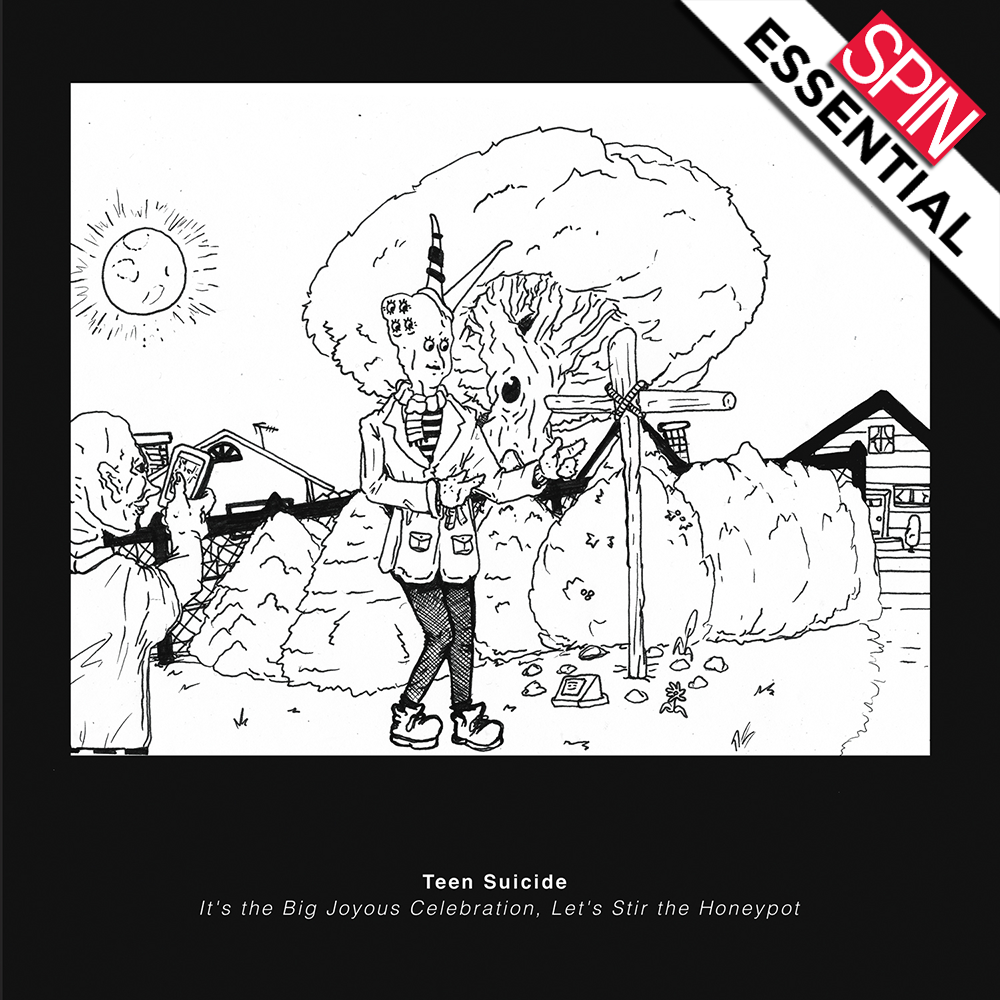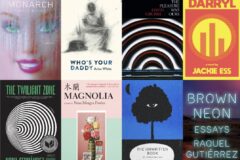Release Date: April 01, 2016
Label: Run for Cover
“How old were you when you first fell out of love with the world?” asks Sam Ray on “America,” midway through Teen Suicide’s second (and what they’ve been teasing as final) album. The question lingers over the record’s 26 tracks, wry and occasionally, yes, joyous-sounding jaunts covering the dismal realities of depression, faith, and addiction in a way that feels lived-in. Rather than taking a judgmental or voyeuristic tone in its stories of buying drugs from a friend’s dad, riding around in pickup trucks, and puking in mall food courts, Ray paints a world of three-dimensional characters trying to cope with exhaustion, resignation, and self-destruction, in the band’s strongest work to date.
That this record even exists is surprising. Ray’s lo-fi indie project ended in early 2013 after a handful of Bandcamp releases led to them becoming cult favorites. The writer/producer focused on other ventures, like the more sedate bedroom-pop of Julia Brown and the sample-based electronic and ambient work of Ricky Eat Acid, garnering exposure to an entirely different base and leading to a renewed interest in the defunct project, even though it was a substantial departure in style. Teen Suicide reunited in 2014 as a result, and Ray spent the next year or so crafting what was intended to be a farewell (to the controversial moniker, if not the project itself), a way to “tie everything up without answering every question.”
A sense of wariness is natural with an ambitious 68-minute double LP named It’s the Big Joyous Celebration, Let’s Stir the Honeypot. Thankfully, the record doesn’t feel overstuffed, but rather a sublimely arranged assortment of vignettes offering a glimpse into Ray’s world. The band’s opus is still lo-fi, but in a way that feels like a stylistic choice that accentuates its homemade feel rather than serving as its overall focus. Ray invites us to eavesdrop as he sings tales punctuated by intimate memories, like tipping too much on a $20 check, taking methadone with friends in a school auditorium, and remembering the 12 unread emails in the inbox of a friend found overdosed on the kitchen floor. In a voice that’s distant but not distracted, the singer creates devastating moments out of simple lines like “I don’t feel safe in my body” on “God,” or “My mom told me to say hi / She doesn’t care you’re getting high” on “If I Don’t See You Before You Leave.” In Ray’s hands, proclamations like “The Things I Love Are Killing Me” aren’t a plea for pity, but a quiet realization you feel has come too late.
Even though Ray wrote the music and lyrics for all but one of the tracks himself, he gets a lot of help from his friends — whether it’s current or former bandmates like Alec Simke and Caroline White, or outside collaborators such as Owen Pallett, Spencer Radcliffe, and members of Elvis Depressedly and Girlpool. The collaborations form a warm collective atmosphere, open and welcoming, full of trumpets, synths, and light distortion that warps the vocals and instrumentation throughout. Apart from the metallic cacophony of “Beauty,” the album is a far cry from the aggression of early Teen Suicide, and a culmination of Ray’s work across all of his projects in the past five years.
There are plenty of familiar signposts throughout, such as the fixation on God and heaven of early Modest Mouse or Pixies, the vulnerability of Elliott Smith, and the emotive home-recordings of the Microphones. Similar to peers like Alex G or Mitski, Teen Suicide exist in a framework clearly indebted to indie rock of the past, but avoid falling into a trap of being overly faithful to canon. Unsurprising for a band whose Twitter handle is “fugazi420,” their irreverence shines when a mid-album cut originally released under the name “Sonic Youth” proclaims, “Pavement were an OK band / But you don’t gotta sound like them / You were two when ‘Cut Your Hair’ came out.”
For a lo-fi project, Celebration is a particularly imaginative, lengthy work full of vivid character portraits, using additional instrumentation and computer-generated distortion to expand far beyond the boundaries of more straightforward guitar-driven indie acts. Along with fellow upstarts like Sheer Mag at a different end of the stylistic spectrum, Teen Suicide show how cheap recording doesn’t have to limit the scope of a band’s goals or vision; this grand statement proves that it’s possible to have it both ways. Between falling out of love with the world and wondering if “heaven is as boring as we’ve always thought,” Ray doesn’t seem to belong anywhere. Whether he’s closing the book on Teen Suicide or opening another one altogether, he strives to build a space for everyone else who feels the same.





